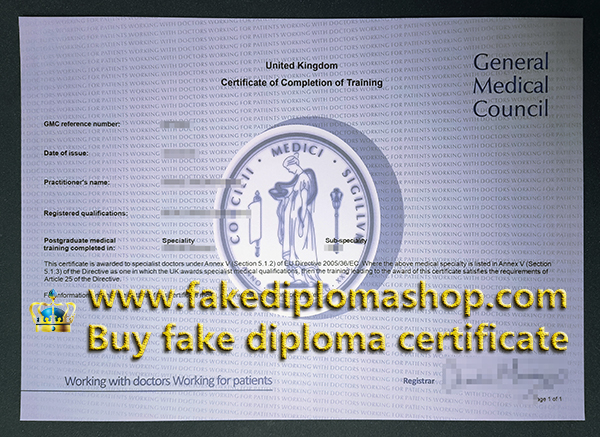
GMC certificate
GMC certificate, How to Replace Your Lost General Medical Council certificate? How long to get a fake GMC certificate? Where to spot a fake certificate maker to duplicate a GMC certificate? Order a fake GMC certificate online, buy a phony UK certificate. The General Medical Council (GMC) is a public body that maintains the official register of medical practitioners within the United Kingdom. Its chief responsibility is to “protect, promote and maintain the health and safety of the public” by controlling entry to the register, and suspending or removing members when necessary.
All the GMC’s functions derive from a statutory requirement for the establishment and maintenance of a register, which is the definitive list of doctors as provisionally or fully “registered medical practitioners”, within the public sector in Britain. The GMC controls entry to the List of Registered Medical Practitioners (“the medical register”). The Medical Act 1983 (amended) notes that, “The main objective of the General Council in exercising their functions is to protect, promote and maintain the health and safety of the public.”
Secondly, the GMC regulates and sets the standards for medical schools in the UK, and liaises with other nations’ medical and university regulatory bodies over medical schools overseas, leading to some qualifications being mutually recognized. Since 2010, it has also regulated postgraduate medical education.
Due to the principle of autonomy and law of consent there is no legislative restriction on who can treat patients or provide medical or health-related services. In other words, it is not a criminal offense to provide what would be considered medical assistance or treatment to another person – and not just in an emergency. This is in contrast with the position in respect of animals, where it is a criminal offence under the Veterinary Surgeons Act 1966 for someone who is not a registered veterinary surgeon (or in certain more limited circumstances a registered veterinary nurse) to provide treatment (save in an emergency) to an animal they do not own.
Parliament, since the enactment of the 1858 Act, has conferred on the GMC powers to grant various legal benefits and responsibilities to those medical practitioners who are registered with the GMC – a public body and association, as described, of the Medical Act of 1983, by Mr Justice Burnett in British Medical Association v General Medical Council.
Registration brings with it the privileges, as they are described, set out in Part 6 of the Act. In reality, they comprise prohibitions for all those not registered. Section 46 prohibits any person from recovering in a court of law any charge rendered for medical advice, attendance or surgery unless he is registered. Section 47 provides that only those registered can act as physicians, surgeons or medical officers in any NHS hospital, prison, in the armed forces or other public institutions. Section 48 invalidates certificates, such as sick notes or prescriptions, if signed by someone who is unregistered. Section 49 imposes penalties via criminal offenses for pretending to be a registered medical practitioner.

